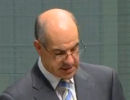 "I, and every other post-war baby boomer, can count myself incredibly lucky to be born when I was, because our children do not have the opportunities my generation had—job and career opportunities, housing opportunities and free education. For all the hype about growth and progress and development building a better world, it is not. It is tougher for our kids than it ever was for us." (Kelvin Thomson Thursday, 14 November 2013, House of Reps Chamber Speech)
"I, and every other post-war baby boomer, can count myself incredibly lucky to be born when I was, because our children do not have the opportunities my generation had—job and career opportunities, housing opportunities and free education. For all the hype about growth and progress and development building a better world, it is not. It is tougher for our kids than it ever was for us." (Kelvin Thomson Thursday, 14 November 2013, House of Reps Chamber Speech)
(Candobetter recommends that you start this video at 2.25 minutes in for the guts of population and planning democracy. Note that in this speech, Thomson refers to his new NGO, Victoria First, but this reference does not seem to be in the proofed Hansard.)
Environment book by the Prince of Wales
[1]
Recently, I read a thorough and detailed book written by His Royal Highness the Prince of Wales. It is called Harmony.
My copy was given to me by Dick Smith. Dick is an outstanding Australian who cares deeply for this country. Dick's work on issues like population and Australian ownership is inspirational for me and, I know, many others.
I absolutely commend Prince Charles's book, Harmony to everyone who is interested in the future of our planet. The breadth of his knowledge is exceptional, and both the intellectual rigour and creative insight lying behind this book are deeply impressive. There is way too much about environment, population, food and architecture in it for me to do justice to it here.
You will have to read it for yourselves. But I will give two examples.
Nature directly benefits peoples' health
Let me cite first page 220, where he discusses academic studies which have found that contact with nature can make people more resilient to illness. One piece of research investigates the recovery rates of patients who had access to a view of trees in a Texas hospital courtyard, compared with those whose windows gave sight of only a concrete wall.
All the patients had undergone the same gall bladder surgery, so were considered to be a broadly comparable group. Those patients who enjoyed a view of trees out the window spent fewer days in hospital, used fewer narcotic drugs, had fewer complications and registered fewer complaints with nurses responsible for their care.
By contrast, the people who could not see images of nature suffered increased depression, were in need of more pain relief and spent more time in recovery. So being exposed to the patterns produced by nature is directly necessary for our health. Prince Charles says the findings underline how harmony and connection with nature is not some vague or fringe concern but has real benefits for people.
Back local residents, not property developers if you want a long career in parliament
The second example I will draw to attention of the House is on page 232, where he bemoans 'the modern trend towards more and more central planning'. He says:
Communities get what others decide for them—there are no alternatives on offer. ...
A top-down approach to planning has been something of a partner of the industrial-scale copybook urban scheme. It is driven by the brutal economics of 'growth' and competitiveness and the pursuit of efficiency targets that care little as to whether a place ends up with 'soul'.
But Prince Charles believes that if people are empowered to work together there are huge benefits.
He says:
"... the ability of people to self organise can be a very powerful force, but sadly it is an opportunity that is too often untapped. Centralised spatial planning devised by specialist planners trained in a 20th century mechanistic ideology sometimes misses fundamental choices and can lead communities in directions that are not in their best interests. I have enough experience now to know for sure that if people had been put more at the heart of the planning process, some of the disastrous urban environments created in many cities during the twentieth century might easily have been avoided."
I personally think it incredibly important that local residents get to determine what kind of street, neighbourhood and community they live in. And I will provide some free political advice to any of the new MPs in this place who decided parliament is all right and that they would prefer a lengthy parliamentary career to a brief one: back local residents, not property developers. I repeat: support local residents, not property developers.
Prefers to remain back bencher so that he can speak out for the environment
I was not a candidate for the opposition front bench.
I was a shadow minister for 10 years prior to 2007. I have been there and done that. It is my experience that being a shadow minister brings with it obligations not to speak outside your portfolio, and to have everything you do say cleared and approved by the Leader of the Opposition's office. For me, these limitations are simply too great in a world and an Australia that I believe is facing massive challenges.
World being irreparably damaged by population growth
The world is being damaged, perhaps irreparably, by rapid population growth, climate change, unchecked rainforest and other habitat destruction, poverty, war and terrorism. Australia is not immune from these challenges. Many of our unique and beautiful birds, plants and animals are on the brink of extinction. Our young people cannot afford to buy a home of their own, and their jobs are insecure, while pensioners and retirees battle rapidly rising electricity, gas and water bills and council rates.
Need to be on the back bench to speak out these problems in Australia
I need to be able to speak out about these things, and I intend to. Anyone who thinks my decision to return to the back bench means that I am looking to lead a quiet life and slip out the back door is very mistaken. On the contrary, it is a necessary pre-condition for being active in the debate about the issues that are of greatest importance to the world and to this country.
I, and every other post-war baby boomer, can count myself incredibly lucky to be born when I was, because our children do not have the opportunities my generation had—job and career opportunities, housing opportunities and free education. For all the hype about growth and progress and development building a better world, it is not. It is tougher for our kids than it ever was for us.
This is not just true for Australia. It is true in many other countries as well. It is heartbreaking to hear the stories of all the African migrants who drowned off the coast of the Mediterranean island of Lampedusa.
Terrible, terrible, terrible. There is a response that says we should tackle this problem by dismantling our borders and allowing people to live wherever they want to live. But anyone who has seen the Gumballs video, by Roy Beck of NumbersUSA—and if you have not, I cannot recommend it too highly—will know that there are two billion people in the world living on $2 per day or less, and that their numbers are increasing by 80 million every year. No nation in the world—not the United States, not Europe, not Australia—can cope with such numbers.
Causes of mass migration
There are two causes of mass migration. One is people fleeing political violence and repression. The other driver is poverty and people wanting a better life. In those countries that are beset by political violence, the most common cause is religious fundamentalism.
There is religious violence, oppression of minorities, not enough respect for the rights of women, and not enough separation between religion and politics and between church and state. This needs to be called out.
It is a task for all of us, from whatever religious or ethnic background we come, to condemn, to denounce, to shun and to treat as outcasts religious leaders who preach hate and violence. It has to be called for what it is. Until political and religious violence stops, there will be people fleeing it.
Of the other motive for getting on board a boat—the search for a better life—again, we all have a role to play. We should lift our foreign aid budget to 0.7 per cent of GDP. We should not cut our aid by $4.5 billion over the forward estimates as the Liberal government is doing. It is claimed there is a budget emergency and we cannot afford this aid. Why then is the defence budget to be increased? The government target of 2 per cent of GDP spending on defence is quite arbitrary, and absolute nonsense. Spending money on aid builds goodwill with our neighbours and makes us more secure. I have seen it with my own eyes—the people in Wills.
In my view, honourable defeat is overrated. In my view there is little honour in avoidable failure. In my view those who want to save the environment, those who want to help workers and those who care about the future have a responsibility to succeed. Honour comes from success, from solving problems, from being able to proudly hand the baton over to the next generation.
Racism accusations used to stifly debate in a new kind of McCarthyism
In political debate people are very frightened about being called racist or xenophobic. This is true of prime ministers and it is true of ordinary people. Yes, there are racists out there. It is a pity; it is true.
But the use of the term 'racism' has become a new kind of McCarthyism, used to stifle debate. Let me point out in response to the allegation of racism or xenophobia against people who want to contest our rapid population growth that, first, Australia is already a multiracial society—one-quarter born oversees, one-half with one or both parents born overseas. The bird has flown. No-one is trying to maintain Australia as a white Anglo Saxon outpost of the British empire. It cannot be done and I have not come across anyone who is trying.
Secondly, stopping rapid population growth will assist Australians of all backgrounds. For example, Broadmeadows has high unemployment. Many unemployed people in Broadmeadows are of Turkish background. They are entitled to our consideration, rather than running migrant worker programs that wreck their ability to find work.
Thirdly, if talking about population makes you a racist, you are in pretty good company.
People do not usually think of Dr Martin Luther King as a white supremacist. What did he have to say about population?
"Family planning, to relate population to world resources, is possible, practical and necessary. Unlike plagues of the dark ages or contemporary diseases we do not yet understand, the modern plague of overpopulation is soluble by means we have discovered and with resources we possess.
What is lacking is not sufficient knowledge of the solution but universal consciousness of the gravity of the problem and education of the billions who are its victims.
People would not ordinarily think of David Suzuki as a puppet or fellow traveller of Pauline Hanson. What did he have to say about population?
Dr Suzuki said:
Of course human numbers are at the very core of our crisis. The explosive rate of growth simply can't continue.
And, while we are at it, I will point out a couple more.
In 1993, former US President Bill Clinton told the United Nations:
"And to ensure a healthier and more abundant world, we simply must slow the world's explosive growth in population."
His vice-president, Al Gore, said:
"I consider the dramatic growth in the world's population to be the greatest challenge currently facing the environment ... The effects of this rapid increase are felt around the globe."
It is ironic in the extreme that we have a couple of agents provocateur out there accusing people who talk about population of trying to hijack the environmental movement when, in fact, they are the most fair dinkum environmentalists you will find. I defy anyone to challenge the environmental credentials of Jacques Cousteau, who has devoted his entire life to marine conservation, and who said:
"Population growth is the primary source of environmental damage."
I defy anyone to challenge the environmental credentials of Captain Paul Watson, the founder of Sea Shepherd Conservation Society, who has spent his life risking injury and imprisonment to harass Japanese whalers. He said:
"The accusation that a stand to reduce immigration is racist is music to the ears to those who profit from the cheap labor of immigrants. They are the same people who love to see environmentalists make fools of themselves. And there is no environmentalist more foolish than one who refuses to confront the fact that uncontrolled human population growth is the no. 1 cause of the world's increasing environmental problems."
NOTES
[1] Thursday, 14 November 2013
HOUSE OF REPRESENTATIVES CHAMBER SPEECH
 You are Cordially Invited to Kew Cottages Coalition Inc. Annual Public Meeting at the Kew Civic Centre, 8pm Tuesday 18th March 2014 (Details and Melways Reference at end of this article). Kew Cottages Coalition Inc. presents "Kew Cottages and the Victorian State Election: A Midsummer Night's Public Meeting" with MC Rod Quantock
You are Cordially Invited to Kew Cottages Coalition Inc. Annual Public Meeting at the Kew Civic Centre, 8pm Tuesday 18th March 2014 (Details and Melways Reference at end of this article). Kew Cottages Coalition Inc. presents "Kew Cottages and the Victorian State Election: A Midsummer Night's Public Meeting" with MC Rod Quantock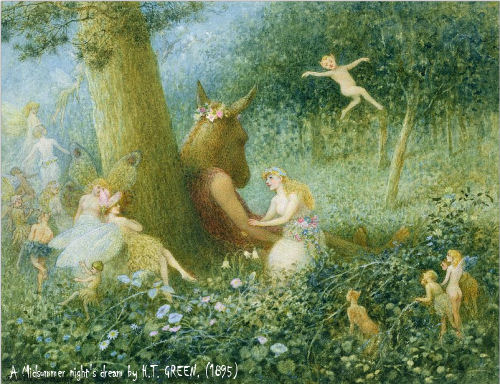

 Chair of the
Chair of the 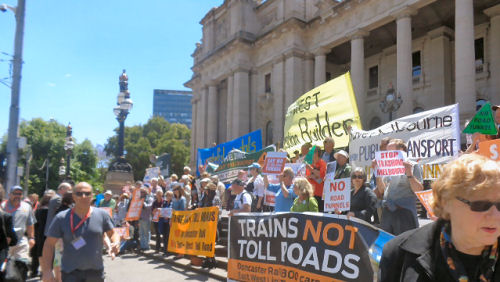 The event took place today on Melbourne's Parliament House steps at 12 noon. Master of ceremonies, Rod Quantock introduced the main speakers - Jackie Fristacky, Mayor of Yarra, Jan Chantry, Mayor of Moonee Ponds, Tony Morton, president Public Transport Users' Association, Richard Foster, Melbourne City councillor, Greg Barber, Leader , Greens Party Victoria MP, Richard Wynne Shadow Minister for Public Transport , Brian Tee, Shadow Minister for Planning , Joe Edwards,West Parkville resident, Keith Fitzgerald, Collingwood resident. Members of community groups announced future events regarding the East West Link campaign.
The event took place today on Melbourne's Parliament House steps at 12 noon. Master of ceremonies, Rod Quantock introduced the main speakers - Jackie Fristacky, Mayor of Yarra, Jan Chantry, Mayor of Moonee Ponds, Tony Morton, president Public Transport Users' Association, Richard Foster, Melbourne City councillor, Greg Barber, Leader , Greens Party Victoria MP, Richard Wynne Shadow Minister for Public Transport , Brian Tee, Shadow Minister for Planning , Joe Edwards,West Parkville resident, Keith Fitzgerald, Collingwood resident. Members of community groups announced future events regarding the East West Link campaign. 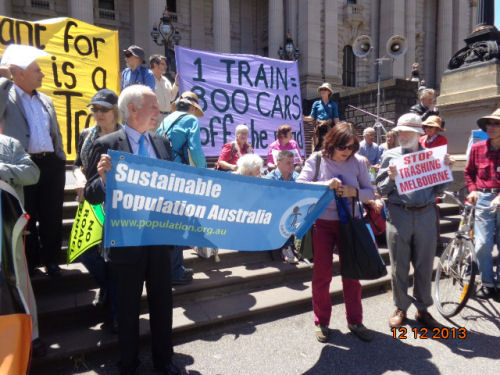
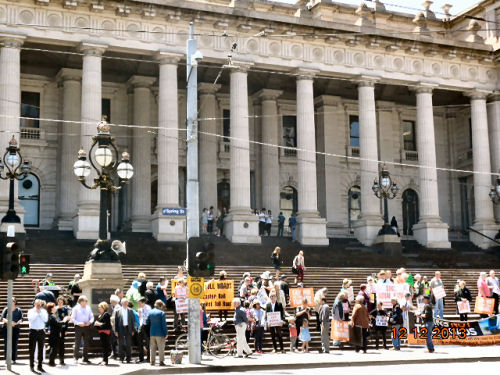
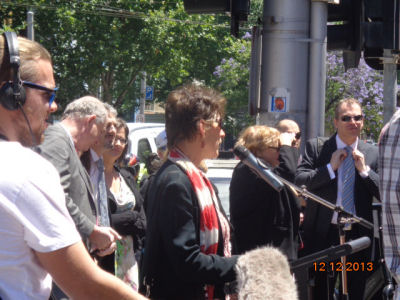

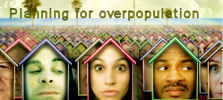 It is typical of the English speaking world that governments that pretend to be democratic, use planners to ride roughshod over the rights of citizens. Here is something from Los Angeles: "In the name of updating its zoning code, Los Angeles is on the verge of overriding community plans across the city by carving out "overlay" neighborhoods in which city employees can approve — by decree and without a hearing or Environmental Impact Report — residential and commercial projects of far greater density than now allowed."
It is typical of the English speaking world that governments that pretend to be democratic, use planners to ride roughshod over the rights of citizens. Here is something from Los Angeles: "In the name of updating its zoning code, Los Angeles is on the verge of overriding community plans across the city by carving out "overlay" neighborhoods in which city employees can approve — by decree and without a hearing or Environmental Impact Report — residential and commercial projects of far greater density than now allowed."
 Mary Drost of Planning Backlash and the
Mary Drost of Planning Backlash and the  Federal Labor Member for Wills, Kelvin Thomson, has condemned reports in an article by Josh Gordon,
Federal Labor Member for Wills, Kelvin Thomson, has condemned reports in an article by Josh Gordon, 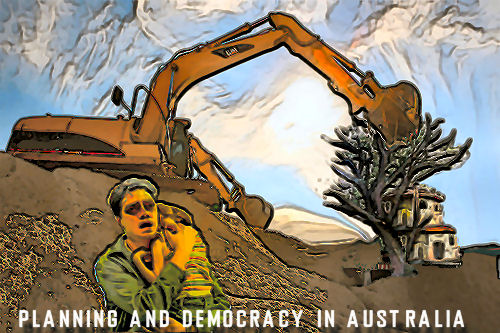
Recent comments